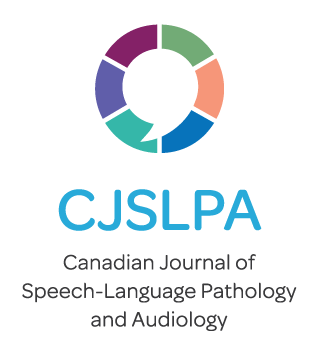

| Author(s) |
Salima Suleman Lu-Anne McFarlane Karen Pollock Phyllis Schneider Carol Leroy |
| Volume | 37 |
| Number | 2 |
| Year | 2013 |
| Page(s) | 146-154 |
| Language | English |
| Category | |
| Keywords |
COLLABORATION COMMUNICATION PROFESSION-SPECIFIC TERMINOLOGY DISCIPLINE-SPECIFIC EDUCATION INTERPROFESSIONAL IPE JARGON STUDENT PROFESSIONAL VOCABULARY SPEECH-LANGUAGE PATHOLOGIST TEACHER |
| Abstract |
A barrier to collaboration is the use of profession-specific terminology that is inaccessible to members outside of one’s own profession. Results presented in this paper are part of a study that examined the efficacy of an interprofessional education (IPE) experience between student speech-language pathologists (SLPs) and student teachers. This paper focuses on analyses pertaining to profession-specific terminology. Results showed that student S-LPs used significantly more profession-specific terminology than student teachers when explaining profession-specific concepts to parents. It was also found that an IPE experience significantly decreased the number of jargon words used by student S-LPs. Finally, when student SLPs and teachers worked together, they used minimal amounts of professionspecific terminology. This study provides evidence for professional preparation programs to allocate time and resources to increase student awareness of profession-specific terminology. Professional speech-language pathologists are encouraged to increase awareness of jargon terms and identify and reduce their use of this terminology in their professional practice. La terminologie spécifique à une profession, qui est inaccessible à quiconque n’est pas membre de la profession, constitue un obstacle à la collaboration. Les résultats présentés font partie d’une étude ayant examiné l’efficacité de l’expérience d’éducation interprofessionnelle (EIP) entre des étudiants en orthophonie et des étudiants en enseignement. Le présent article se concentre sur des analyses portant sur la terminologie professionnelle. Les résultats ont montré que les étudiants en orthophonie utilisaient significativement plus de termes spécifiques à la profession que les étudiants en enseignement lorsqu’ils expliquaient aux parents des concepts propres à la profession. On a trouvé qu’une expérience d’éducation interprofessionnelle (EIP) diminuait de façon significative le nombre de mots de jargon utilisés par les étudiants en orthophonie. Enfin, quand les étudiants en orthophonie et les étudiants en enseignement travaillaient ensemble, ils utilisaient moins de termes spécifiques à la profession. Cette étude montre que les programmes de formation professionnelle devraient allouer du temps et des ressources à la sensibilisation des étudiants concernant la terminologie spécifique à la profession. Les orthophonistes sont encouragés à prendre conscience de l’utilisation qu’ils font des termes |
| Record ID | 1126 |
| Link | https://cjslpa.ca/files/2013_CJSLPA_Vol_37/No_02_128-181/Suleman_McFarlane_Pollock_Schneider_Leroy_CJSLPA_Summer_2013.pdf |
CJSLPA is an open access journal which means that all articles are available on the Internet to all users immediately upon publication. Users are allowed to read, download, copy, distribute, print, search, or link to the full texts of the articles, or use them for any other lawful purpose.
CJSLPA does not charge authors publication or processing fees.
Copyright of the Canadian Journal of Speech-Language Pathology and Audiology is held by Speech-Language and Audiology Canada (SAC). Appropriate credit must be given (SAC, publication name, article title, volume number, issue number and page number[s]) but not in any way that suggests SAC endorses you or your use of the work. You may not use this work for commercial purposes. You may not alter, transform, or build upon this work.